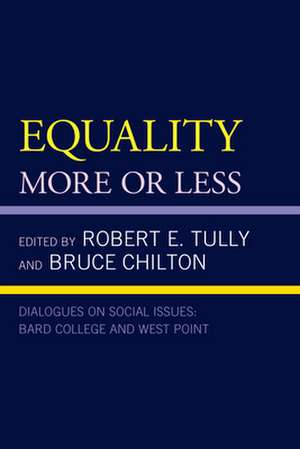EQUALITYMORE OR LESS: Dialogues on Social Issues: Bard College and West Point
en Limba Engleză Paperback – 11 dec 2019
Together, the studies reveal both conflicting standards of equality as well as patterns of pernicious inequality. In an ideal world, equality and inequality among humans would vary in acceptable proportion, increase of the one ensuring decrease of the other. Unfortunately, as the studies illustrate, any such expectation of progress in the real world is almost routinely thwarted.
Despite the wide variety of topics, a common thread binds these essays. Human nature seems to harbor a moral deficiency lying deeper than any written laws and those traditional customs which promote inequality and breed injustice. The fault is prominent in those who champion unjust laws or who willingly enforce discrimination but it is no less active in the silent many who condone the practice. The essays reveal the same persistent and unappealing trait which social groups from the remote past to the present manifest in various ways: blind determination to perpetuate whatever advantages one group believes it enjoys over another, convinced that its own members are more equal than theirs. Being made unequal, the others too easily become targets who are considered less worthy, sometimes even less human.
Preț: 470.83 lei
Nou
Puncte Express: 706
Preț estimativ în valută:
90.11€ • 93.72$ • 74.39£
90.11€ • 93.72$ • 74.39£
Carte tipărită la comandă
Livrare economică 14-28 aprilie
Preluare comenzi: 021 569.72.76
Specificații
ISBN-13: 9780761871163
ISBN-10: 0761871160
Pagini: 430
Dimensiuni: 152 x 229 x 21 mm
Greutate: 0.54 kg
Editura: Rowman & Littlefield
Seria Dialogues on Social Issues: Bard College and West Point
ISBN-10: 0761871160
Pagini: 430
Dimensiuni: 152 x 229 x 21 mm
Greutate: 0.54 kg
Editura: Rowman & Littlefield
Seria Dialogues on Social Issues: Bard College and West Point
Notă biografică
Cuprins
List of Illustrations
Acknowledgments
Introduction by R. E. Tully
Part I: Historical Perspectives
Chapter 1: Equality Deferred: A Litany of Discrimination by Robert J. Goldstein
Chapter 2: Equality and Diversity in the Late Ottoman Empire and Modern Turkey by George
W. Gawrych
Chapter 3: The Social Practice of (In)equality in Nazi Germany by David S. Frey
Chapter 4: Social Inequality and the United States Army: The (Un)lucky Seven by Morten G.
Ender and Betsy Lucal
Chapter 5: Civil War Pension Policy: The Politics of Policy Subsystems by Brandon Jason
Archuleta
Chapter 6: Selecting a Military Court-Martial Panel: A Study of Inequality by LTC Christopher
Jacobs
Chapter 7: United Nations Peace Missions and Protection of Civilians: Equality versus
Efficiency? by Darya Pushkina
Part II: Theological Perspectives
Chapter 8: Ultimately Equal and Relatively Complicated: Questions about Equality in Teaching
Buddhist Studies by Dominique Townsend
Chapter 9: The Rabbinic Meritocracy and Its Discontents by Shai Secunda
Chapter 10: Equality in Paul of Tarsus¿More and Less by Bruce Chilton
Chapter 11: The Perilous Promise of Equality: Scriptural Politics in Contemporary Iran by
Tehseen Thaver
Chapter 12: Gandhi, Krishna, and Caste: Inequality More or Less by Richard H. Davis
Part III: Philosophical Perspectives
Chapter 13: Men of Fortitude: Gender and Combatant Non-Immunity in War by Graham
Parsons
Chapter 14: Minding Gibbon¿s Manners: Unwritten Rules and the Rhetoric of Equality by Hugh
Liebert
Chapter 15: A Kantian Approach to Recognizing Privilege by Courtney Morris
Chapter 16: Inequality in Skepticism by R. E. Tully
Epilogue by Bruce Chilton
Index
About the Contributors
Descriere
This book examines a fundamental social paradox: although less equality certainly entrenches injustice, more equality may nevertheless protect the advantages that one group enjoys over fellow citizens. Their studies confront us with vivid cases where equality for some is preferred to equality for all.

